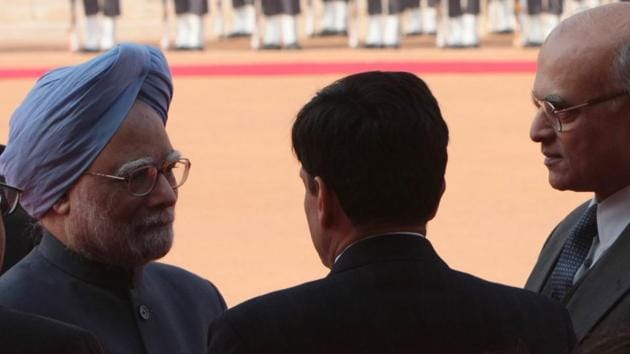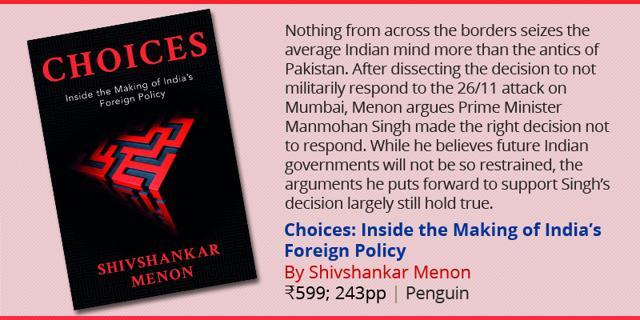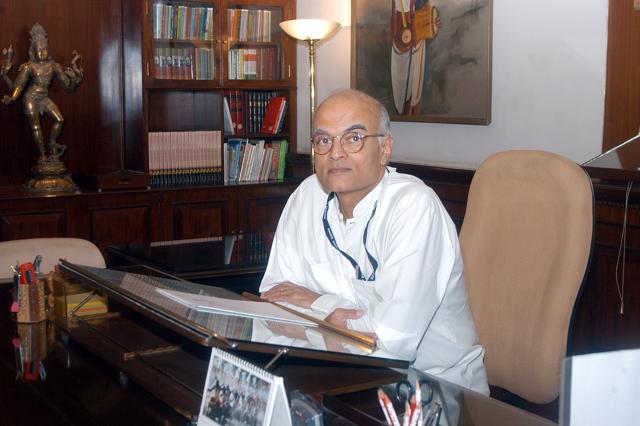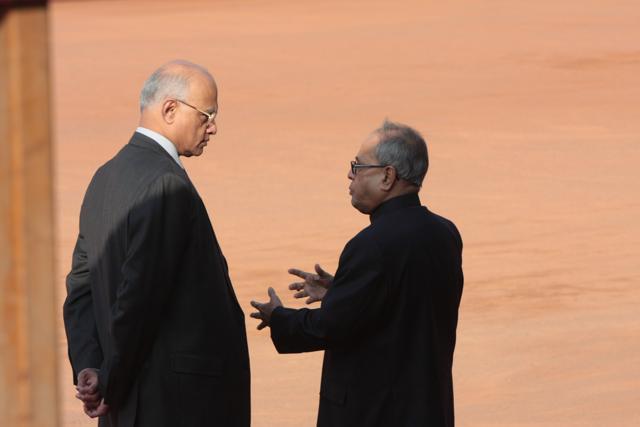Context is Everything; Review of Shivshankar Menon’s Choices - Inside the Making of India’s Foreign Policy
Former National Security Adviser Shivshankar Menon, among India’s most cerebral diplomatic practitioners, ponders the nature of Indian foreign policy.
Anyone who speaks before an audience of Indians about their country’s foreign policy faces a standard question list. Why do we not use overwhelming military force to punish Pakistan after a terrorist attack? How close can we get to the United States given their record of playing footsie with our enemies? Does it make sense to say India will never use nuclear weapons first?

Shivshankar Menon, among our most cerebral diplomatic practitioners, attempts to answer these and other questions by providing case histories of New Delhi’s decision-making regarding a number of foreign policy problems. He interweaves – sadly too few – personal anecdotes in each narrative and, intermittently, ponders the nature of Indian foreign policy.
The opening chapter is on China, the country he knows the best and the one that happens to be India’s greatest strategic challenge. There is an excellent description of the years of twists and turns in the bilateral push-and-shove over the border and how late Prime Minister PV Narasimha Rao decided to target an administrative management of the border rather than seek a political solution.

India’s strategy against a much stronger opponent, Menon writes, has been “diplomatic efforts…focused on convincing China that any misadventure would result in embarrassment and pain to that country and would frustrate the leadership’s political goals.”
Worryingly, this is not as easy it once was. One reason is that with both India and China rising in power, their relative sense of negotiating strength is perpetually changing. More recently it is “China’s silence or ambivalence about the rise of India that poses a puzzle and a challenge”. Beijing is more open in its support for Pakistan, more public in acting against India’s interests elsewhere in the world and generally a lot more difficult to handle. However, Menon argues, it is not clear why this shift has taken place though he speculates, somewhat unconvincingly given Beijing’s overall bolshiness across Asia, that the Indo-US nuclear deal could have played a role.
The labyrinthine nuclear negotiation with the US is used to inspect the changed landscape of Indo-US relations. Critics of the deal and the closeness to the US in general point to a trail of broken promises by Washington, particularly in the nuclear field. The nuclear deal was marked by some fudging on both sides. Ultimately, New Delhi knew it could never stop Washington from ripping apart its written pledges if it felt it necessary some time in the future. “The real answer was that US commercial, strategic and other interests once enmeshed in the Indian programme, would ensure continuity,” argues Menon. When dealing with superpowers, context is everything.
A presumable desire for brevity means the nuclear deal chapter is incomplete: it ignores the crucial role of the Indian-American community and the benefits of the end of dual-use technology sanctions. He claims the India’s nuclear liability law simply reflected existing norms. This was clearly not the case as its passage led to the shutdown of India’s decades-old domestic nuclear component industry for several years.

Nothing from across the borders seizes the average Indian mind more than the antics of Pakistan. After dissecting the decision to not militarily respond to the 26/11 attack on Mumbai, Menon argues Prime Minister Manmohan Singh made the right decision not to respond. While he believes future Indian governments will not be so restrained, the arguments he puts forward to support Singh’s decision largely still hold true.
There is only gloom and doom when it comes to India’s western neighbour. “Pakistan’s steady slide into incoherence, its disintegration into multiple power centers, and the diminishing writ of the state also means that support for cross-border terrorism could actually grow in the future,” he writes. “Indian policymakers and diplomats must be prepared for the long struggle to continue without decisive military solutions, and set ourselves modest political goals in this struggle. Temporary silencing the cross-border terrorists is the best we can hope for…” Islamabad will remain the dark ballast to India’s global rise.
India’s involvement in the Sri Lankan civil war was New Delhi’s most traumatic overseas adventure. It led to thousands of Indian deaths including that of the prime minister, Rajiv Gandhi, most responsible for India’s entanglement.
Given the important lessons India should be deriving from this war, the chapter on the Lankan war is less than satisfying. One still gets a sense of a New Delhi outmanoeuvred by a wily Sinhala leadership when it sent in the troops. There is no discussion on how Indian foreign policy should navigate an overseas crisis which elicits strong state-level political passions. Menon concludes the civil war’s level of bloodshed was probably unavoidable and was an example of poor options and “minimax foreign policy decisions – decisions aimed at minimizing the harm to ones own interest while maximizing the gain.”

Given ill-informed commentary questioning India’s no-first-use nuclear doctrine, Menon provides a clinically rational exposition as to why this is the only doctrine that makes sense for India. Nuclear weapons, he points out, “are primarily political weapons, the currency of power in the nuclear age, rather than effective war-fighting weapons.” India’s nuclear arsenal exists to ensure the country is not blackmailed by another nuclear actor, not to give it blackmailing abilities. “Assured retaliation combined with a no first use policy also means that it is not the number of nuclear weapons that India or its adversaries possess that matters. What matters is India’s ability to inflict unacceptable damage in retaliatory strike or strikes.” He summarises it in one line: first strike equals aggression, no-first-use equals deterrence.
Read more: Why India didn’t attack Pakistan after 26/11 Mumbai attacks - An excerpt from Choices
Amid all these tales of policy, Menon tries to define and defend an Indian way of foreign policy. New Delhi’s global actions are marked by “boldness in conception, allied with caution in implementation” but this does not amount to a “culture of restraint” as some critics have argued. He says India is not a status quo power but wants to modify though not overthrow the existing world order. He criticizes the Modi government for being marked “by much activity and energetic projection” but without a “conceptual framework.” Like everyone else, Menon says India’s engagement with the world suffers from capacity. The Indo-US nuclear deal was a herculean diplomatic task but it sapped New Delhi’s resources. “If India wishes to be taken seriously by the world as a power, our diplomatic machine should be able to work three or four such issues at any one time. We are not there yet…”



